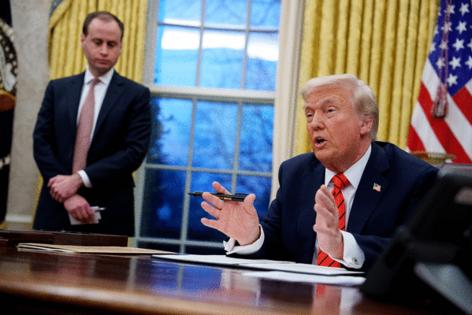Taking money for presidential pardons? It's likely legal -- with a catch, experts say
Published in News & Features
Since returning to power, President Donald Trump has issued a flurry of pardons — including to supporters, celebrities and convicted white-collar criminals — some of which have raised eyebrows.
One controversial act of clemency occurred in April, when Trump granted an unconditional pardon to Paul Walczak, a convicted tax cheat due to serve an 18-month prison sentence.
It came just weeks after his mother attended a $1-million-per-person fundraiser at Mar-a-Lago, the president’s Florida estate, The New York Times reported.
While there is no direct evidence of impropriety, the episode raises the question: Could a president be prosecuted for accepting bribes for pardons?
Probably not, according to legal experts, who say the president is likely entirely immune from prosecution thanks to a recent Supreme Court ruling.
However, other parties involved in a bribery scheme — like those who offer to pay the president — may not be so fortunate.
Can the president be prosecuted?
In a landmark 2024 case titled Trump v. United States, the Supreme Court ruled 6-3 that presidents have absolute immunity from criminal prosecution for acts committed in the realm of their “core constitutional powers.”
Since the authority to issue pardons for federal crimes is held solely by the president, this would be categorized as a core constitutional power.
Justice Sonia Sotomayor said as much in her dissenting opinion, writing that, if the president took “a bribe in exchange for a pardon,” he would be “immune, immune, immune.”
Sotomayor, appointed by former President Barack Obama, added that the court’s ruling “effectively creates a law-free zone around the President.”
Five legal experts concurred with her opinion, saying that, at the very least, the high court ruling makes prosecution for bribery extremely difficult.
“I think Justice Sotomayor correctly asserted that the immunity decision would cover pardons resulting from bribes,” Bernadette Meyler, a constitutional law professor at Stanford Law School, told McClatchy News.
“The Court’s immunity decision certainly makes any legal challenges or prosecutions involving pardons … say to reward political loyalty or a monetary contribution … much more difficult, if not impossible,” Leah Litman, a professor at the University of Michigan Law School, told McClatchy News.
With that being said, the court may have left a door open for prosecutions related to pardons, experts said.
The majority opinion “has this weird footnote,” Litman said.
Footnote 3 indicates the president could be prosecuted for bribery, but that evidence related to “the official act itself” — for example, a pardon — would need to be excluded from legal proceedings.
“However, that’s difficult to square with what the majority says elsewhere, including that presidential motive cannot be considered in deeming whether the president is acting officially or within the scope of core powers,” Michael Dorf, a professor at the Cornell Law School, told McClatchy News.
“So ... maybe there could still be legal challenges or prosecutions,” Litman said. “But the Court definitely created real uncertainty about whether they would be.”
Further, prosecuting a president for bribery related to pardons would be unprecedented. Despite this, there have been multiple instances where presidential pardons were subject to scrutiny due to the appearance of possible influence or impropriety.
For example, in the final days of his second term, former President Bill Clinton pardoned indicted financier Marc Rich, who had strong ties to the Democratic Party. Rich’s ex-wife, Denise Rich, had given $450,000 to the Clinton presidential library ahead of the pardon, ABC News reported.
The decision triggered a federal investigation, which ultimately resulted in no charges.
But, while precedent and the recent Supreme Court ruling make prosecuting a president unlikely, the long arm of the law could still reach other individuals tied to a bribery scheme, experts said.
Can others be prosecuted?
Legal experts made clear that other parties involved in a pay-for-pardon scheme could still be prosecuted.
“The presidential immunity does not extend to third parties, even if they are directly on the other side of the transaction,” Dorf said. “One of the arguments of Trump’s lawyers was that immunity for the president would not be catastrophic for just this reason.”
However, there are at least several reasons why prosecuting an individual accused of bribing the president for a pardon would be an uphill battle.
“A technical problem would be presenting adequate evidence, since under the Supreme Court’s decision, it appears that the president might be protected against any form of evidentiary interrogation,” Sanford Levinson, a constitutional law professor at the University of Texas Law School, told McClatchy News.
Additionally, it’s unlikely that someone who tried to facilitate a bribe would be prosecuted federally while the president on the other side of the transaction remains in office, Meyler said.
The president “could simply direct the DOJ to drop the prosecution,” she noted.
But, if state laws were violated, the individual would still be prosecuted under state law, which the president has no jurisdiction over, Caroline Corbin, a professor at the University of Miami School of Law, told McClatchy News.
Still, there’s one final complicating factor: The president can always issue another pardon.
“If the person seeking a pardon violated federal law, presumably the President could just pardon that violation,” Corbin said.
_____
©2025 The Charlotte Observer. Visit charlotteobserver.com. Distributed by Tribune Content Agency, LLC.







Comments